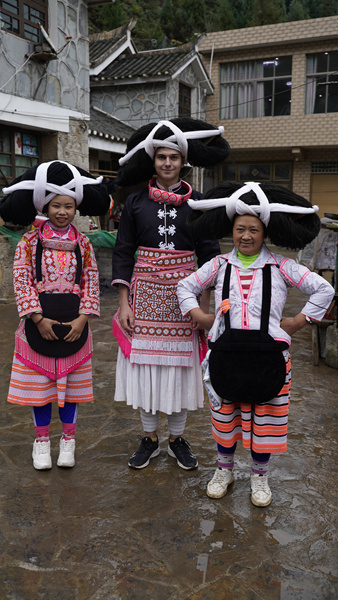Ethnic groups in focus
By Yang Feiyue | China Daily | Updated: 2021-12-08 08:21

A cultural calling
After Adolf finished filming the online series with CCTV in June, he resolved to make his own documentary that would capture the country's rich ethnic culture.
"I was not so busy, because of the ongoing pandemic abroad, so I figured why not take a break and do what the heart wants," he says.
In July, Adolf planned the documentary with three of his friends, two photographers Liu Ming and Zhu Kewei, as well as Dong Yuze. He acts as the host in front of the camera and engages in non-scripted filming of the authentic life of the ethnic Chinese people.
Adolf even got his driver's license two months before the four embarked on a journey in early September. They drove from Lianyungang across Central China's Hubei province and South China's Guangxi Zhuang autonomous region to Southwest China's Guizhou province.
In Enshi Tujia and Miao autonomous prefecture of Hubei, Adolf enrolled in a Tujia dialect class at a local school.
In Huangluo Yao village, Guangxi's Guilin, he was amazed by women in traditional ethnic costumes, their exquisite hair-grown to more than 1 meter long-and the distinct bamboo barbecues.
In October, in Sandu Sui autonomous county in Guizhou, Adolf went to the bustling village fair and celebrated the Duan Festival. The festival is the major carnival of the year for the Sui people. According to the Sui calendar, it starts in the 12th month and ends in the second month of the following year (around September to the end of October in the Gregorian calendar). It is one of the longest festivals in China, and one where the Sui people offer sacrifices to their ancestors and celebrate the harvest and the coming of the new year.
























